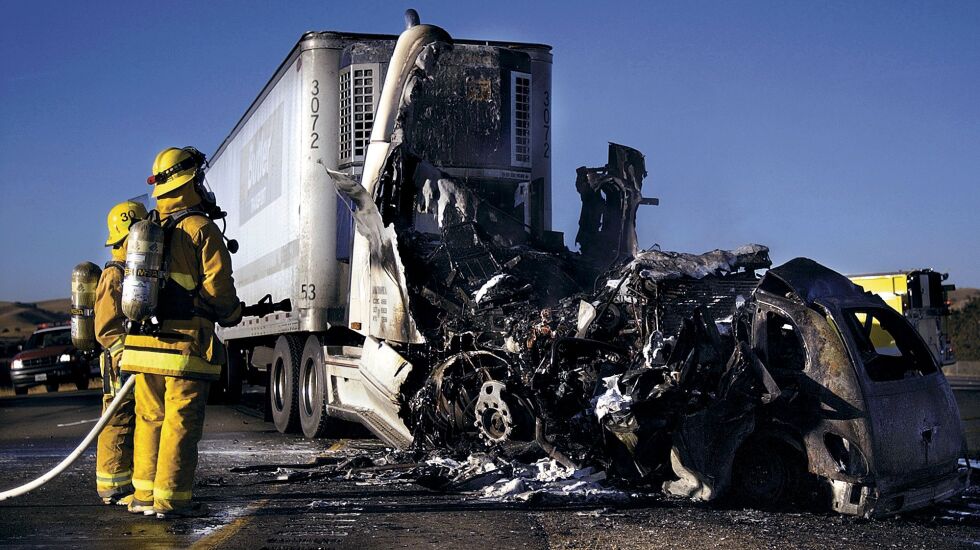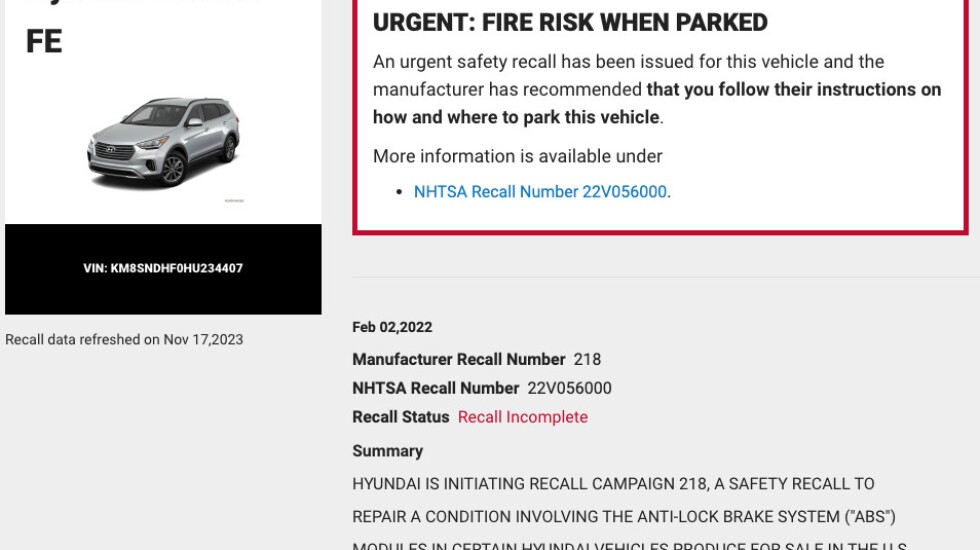
Under federal law, a rental car company can’t hand a customer the keys unless all safety recalls have been repaired, but there’s no such requirement for consumers buying a used car.
Which means what’s being touted as a “certified preowned” car on a dealer’s lot could still be a vehicle that has open, unaddressed recalls for safety issues like having a known fire risk or a problem with sudden acceleration. Those used cars could even be subject to an “urgent, do not drive” recall because their airbag inflators might explode.
When you buy toys, appliances, food or pharmaceuticals, you don’t face a similar risk because those can’t be sold in the United States if they’re under a recall.
“You can’t even sell a recalled consumer product at a yard sale,” says Sean Kane, president of Safety Research & Strategies, which advocates for vehicle safety.
How widespread is the practice? To see, a Chicago Sun-Times reporter followed up on the newspaper’s 2019 investigation of open recalls and found dozens of used vehicles offered for sale on dealers’ websites and used-car listing websites over the past two months despite them being under recall for safety issues that the sellers hadn’t fixed.
And that’s perfectly legal.
Efforts to change this have failed amid pushback from an automobile industry that says fixing the recalled vehicles before putting them up for sale would be too burdensome and costly.
Consumer advocates say that means it’s “buyer, beware,” when you’re buying a used car.
“It’s the kind of thing that keeps me awake at night,” says Rosemary Shahan, president and founder of the nonprofit Consumers for Auto Reliability and Safety.
In just a few hours of online shopping, the Sun-Times found used cars for sale despite having National Highway Traffic Safety Administration recalls over potentially dangerous problems, including:
- Seven Kia Sportage sport-utility vehicles offered on CarMax.com, all with open recalls over the same problem involving a defective tow-hitch module, which can catch fire even when the ignition is off, according to NHTSA. The federal agency advises owners to “park your vehicle outdoors and away from other vehicles or structures” because of the fire risk.
- AutoNation.com listed four used Ram 3500 trucks with open recalls, including a 2021 model priced at $52,399 that had three open recalls, two that could lead to a vehicle fire.
- A $205,995 used 2022 Mercedes-Benz G63 AMG listed by a seller on Chicago-based Cars.com had an open recall for a defective fuel-pump impeller that could shut down unexpectedly and pose a risk of crashing.
- Used vehicles for sale on Carfax.com with open recalls included a 2010 Dodge Charger SE touted as a “great value” at $4,400 that had an open recall for a defective airbag inflator that NHTSA says “could result in … serious injury or death.” Like Cars.com, Carfax publishes paid listings from dealers.


The Sun-Times even found recalled vehicles for sale to the public on the federal government’s General Services Administration website, including recalled Hyundai cars that face the same “Urgent: Fire risk when parked” notice.
Cook County lawsuit pegged to recall
An unaddressed recall was the crux of the lawsuit that Ahmad Ismail filed in Cook County circuit court in August 2022 against Hyundai Motor America and a dealership that serviced the used 2013 Hyundai Sonata his father later bought.
Ismail said in the civil case that, although a recall was issued in September 2018 for a defect in the airbag control unit, it wasn’t addressed by the previous owner. The car wound up at a dealership in Indiana, where Ismail’s father bought it in April 2021, apparently unaware of the danger.
Eight months later, Ismail, then 24 and living in Orland Park, had a head-on collision on Michigan Street in Hammond, Indiana, in which the driver’s airbag didn’t deploy, according to his lawsuit. It says that, trapped in the car, he was badly injured, flown by helicopter to the University of Chicago Medical Center for surgery. As a result of the crash, he suffered “permanent pain and suffering, disability, loss of a normal life” as well as faced medical and therapy bills, according to his lawsuit, which was settled out of court in September.
Ismail’s attorney Eugene Hardiman says he and his client won’t comment because of a confidentiality clause in the settlement.
Asked about the settlement, Hyundai spokesman Ira Gabriel says: “Hyundai is dedicated to providing important recall information to owners and we are fully committed to ensuring the quality and integrity of our products. This case has been resolved.”
Similar lawsuits have been settled around the country, typically including similar non-disparagement clauses in which the litigants agree not to talk about their cases.
Earlier this year, the father of an Arkansas man settled his lawsuit against a car dealer in the death of his 19-year-old son that he blamed on a defective airbag inflator. The car was under recall at the time the dealer sold the vehicle to an auto auction, from which the family later bought it.
Less than a month after the purchase, in July 2018, Aaron Lee Carothers was driving the 2007 Chrysler 300 — which the lawsuit says was sold to the family despite having “an extremely dangerous hidden, deadly danger” — when he was forced off the road by a truck and struck a tree.
The airbag deployed, but the inflator exploded, the lawsuit says, sending shards of metal into Carothers’ body and causing severe injuries. The suit says he underwent numerous surgeries and suffered from post-traumatic stress disorder and died 14 months later.
Recall disclosures vary
Millions of cars across the United States are recalled each year over safety problems. These can range from a needed software fix to major mechanical defects that could cause injuries or death.
To fix a recall issue, a vehicle’s owner can take it to any manufacturer-authorized dealer and have it repaired for free.
About 60% of recalls are remedied that way each year, according to NHTSA statistics.
But disclosures of open recalls on auto sales websites aren’t always obvious. They can range from easy-to-spot to buried-at-the-bottom.
The most forthright was the one on the federal government website of the General Services Administration, which highlights recalled vehicles with a red “yes.”
CarMax displays a blue box on each car’s listing, under the “CarMax Certified” section, that says, “Check for Unrepaired Safety Recalls.” It has a link that goes to NHTSA’s lookup tool, where the car’s vehicle identification number is automatically entered.
After questions raised by officials in several states dating to 2014, CarMax has made it easier for consumers to check online for open recalls. At its dealerships, car window stickers explain how to check for recalls. Before a purchase, customers are shown the vehicle’s recall information from NHTSA’s site. That information is shown again if they go through with the purchase. And they must sign a form acknowledging receipt of the information.
“We really want to be transparent,” a CarMax spokeswoman says.
Carfax.com’s listings explicitly mention the existence of open recalls at the top of the web page. Online shoppers also get a free Carfax report.
On AutoNation.com, the Sun-Times was able to check vehicle history and recalls via a free Carfax report. Cars.com also offers free Carfax or AutoCheck reports and notes open recalls. Recalled vehicles on Carvana.com include the disclosure “this vehicle has an open recall” — though that was below mentions of a “clean history” and a “150-point inspection.”
TrueCar.com has a harder-to-spot disclosure. Looking at a listing for a 2006 BMW 325xi, a reporter was offered a free AutoCheck report. But the first reminder to check for recalls came at the bottom of the website. After copying and pasting the car’s VIN into the NHTSA lookup tool, we found two unfixed recalls, both of which could cause a fire.
Not unexpectedly, most websites play up the positive aspects of the vehicles. They include descriptions like “125-point inspection” or “certified.”
Shahan says those can minimize potential dangers, that consumers are led to believe that being “certified” or “inspected” means a car is safe to drive even if it has a recall that poses a safety hazard.
“How can a car possibly pass this rigorous inspection if it has bad brakes or all these other things?” Shahan says.

Car dealers shift responsibility for repairs
Under federal law, car dealers can’t sell a new vehicle that’s the subject of any recall without first making the necessary repairs. But there’s no such requirement for used-car sellers mandating that they address open recalls.
Used-car dealers, particularly independent dealers not connected to an automaker, have argued that instituting such a requirement would saddle them with huge numbers of unsellable cars. They say that’s because some recalls are announced before the needed parts are available or they might involve millions of cars at once, meaning a fix could take months or even longer.
Independent dealers have said they fear they’d be sent to the back of the line for repairs while branded dealerships service their customers first.


A notable exception is CarBravo.com, run by General Motors to promote its dealerships’ used-car inventories. When the site was launched last year, it promised that every car listed “is certified and recall-free,” earning praise from the Consumer Federation of America.
The National Independent Automobile Dealers Association says it “encourages dealers to disclose known information when selling a vehicle with an open safety recall.”
Like CarMax, AutoNation says it provides customers with disclosures about recalls before purchase and has them sign an acknowledgement.
“If the parts are on hand we repair the vehicle. If there are no parts available for the foreseeable future, contingent on manufacturer instructions, we either hold the vehicle or sell it with full disclosure,” the company says.
Carvana and TrueCar won’t comment.
Michael Brooks, executive director of the nonprofit Center for Auto Safety, says dealers are putting the responsibility on shoppers who might not follow through.
“They just want to sell the car to these people and tell them there’s a recall and they need to fix it, and we know consumers are not that great at it,” Brooks says.
Deaths spark rental car law
With rental cars, the rules are different. Rental companies with fleets of more than 35 vehicles must fix recalls before renting or selling. That’s under a federal law that took effect in 2016.
NHTSA drove that point home last month in a consent order with Zipcar after the regulator found that the car-sharing company had rented consumers recalled cars in 2017 and 2018. The company agreed to a $300,000 civil penalty and said it implemented a system to detect and address open recalls.
The rental car law was passed after Raechel Houck, 24, and Jacqueline Houck, 20, sisters from California, were killed in a 2004 crash in a rented Chrysler PT Cruiser that, unbeknownst to them, had an open recall for a power-steering hose defect.
The car apparently began leaking steering fluid, then caught fire. Having lost the ability to steer, the sisters collided head-on with a semitractor-trailer truck.

Outrage over the crash helped spur regulation of recalls in the rental car industry, but consumer groups trying to pass a federal law for used cars failed. A bill introduced in the U.S. Senate in 2021 by three Democrats — Richard Blumenthal of Connecticut and Edward Markey and Elizabeth Warren of Massachusetts — would have allowed dealers to sell unrepaired recalled vehicles wholesale but not to the public. The bill never made it out of committee.
Federal and state regulators have worked out settlements with car dealers in deals that have helped cement the practice of selling used cars with open recalls.
The Federal Trade Commission entered into consent agreements with CarMax, General Motors and four dealer groups in 2016 that allowed them to keep selling used vehicles with unrepaired recalls. It even let them promote those vehicles to potential buyers as “safe” or “repaired for safety issues” as long as the companies clearly and conspicuously disclose that the vehicles still might be the subject of an unrepaired recall.
Last year, Illinois Attorney General Kwame Raoul and a bipartisan group of attorneys general and state consumer protection officials from 35 other states settled their investigation into CarMax by allowing the used car giant to continue selling used vehicles with unrepaired recalls as long as CarMax increased its disclosures.
Under the settlement, which included a $1 million payment split among the states, CarMax agreed to include hyperlinks online and QR codes at its stores to give consumers direct access to recall information as they shop.
CarMax also agreed to give consumers written information about open recalls before presenting any sales paperwork.
When the agreement was announced in December 2022, Raoul lauded it, saying, “Consumers deserve to know if a vehicle they are considering purchasing has an unrepaired recall that could jeopardize their safety and the safety of the motoring public.”
But Shahan and other consumer advocates say regulators should have gone further, treating used cars like other consumer products that can’t be sold while the subject of a recall.
“It was worse than nothing,” Shahan says. “It basically condones the practice.”







